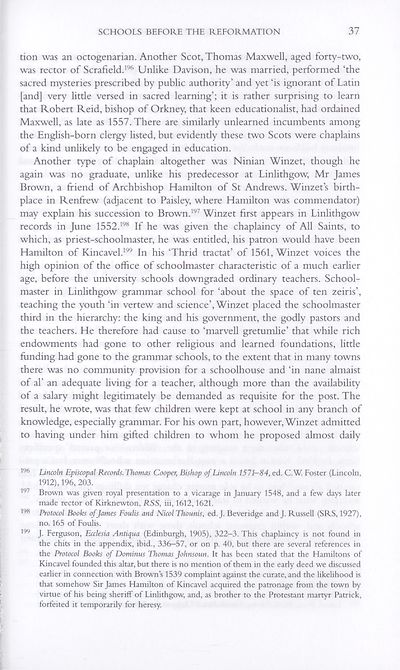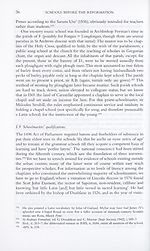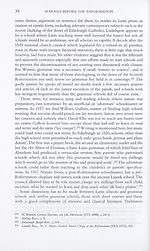Series 5 > Scottish Schools and Schoolmasters 1560-1633
(60) Page 37
Download files
Complete book:
Individual page:
Thumbnail gallery: Grid view | List view

SCHOOLS BEFORE THE REFORMATION
37
tion was an octogenarian. Another Scot, Thomas Maxwell, aged forty-two,
was rector of Scrafield.196 Unlike Davison, he was married, performed ‘the
sacred mysteries prescribed by public authority’ and yet ‘is ignorant of Latin
[and] very little versed in sacred learning’; it is rather surprising to learn
that Robert Reid, bishop of Orkney, that keen educationalist, had ordained
Maxwell, as late as 1557. There are similarly unlearned incumbents among
the English-born clergy listed, but evidently these two Scots were chaplains
of a kind unlikely to be engaged in education.
Another type of chaplain altogether was Ninian Winzet, though he
again was no graduate, unlike his predecessor at Linlithgow, Mr James
Brown, a friend of Archbishop Hamilton of St Andrews. Winzet’s birth¬
place in Renfrew (adjacent to Paisley, where Hamilton was commendator)
may explain his succession to Brown.197 Winzet first appears in Linlithgow
records in June 1552.198 If he was given the chaplaincy of All Saints, to
which, as priest-schoolmaster, he was entitled, his patron would have been
Hamilton of Kincavel.199 In his ‘Thrid tractat’ of 1561, Winzet voices the
high opinion of the office of schoolmaster characteristic of a much earlier
age, before the university schools downgraded ordinary teachers. School¬
master in Linlithgow grammar school for ‘about the space of ten zeiris’,
teaching the youth ‘in vertew and science’, Winzet placed the schoolmaster
third in the hierarchy: the king and his government, the godly pastors and
the teachers. He therefore had cause to ‘marvell gretumlie’ that while rich
endowments had gone to other religious and learned foundations, little
funding had gone to the grammar schools, to the extent that in many towns
there was no community provision for a schoolhouse and ‘in nane almaist
of al’ an adequate living for a teacher, although more than the availability
of a salary might legitimately be demanded as requisite for the post. The
result, he wrote, was that few children were kept at school in any branch of
knowledge, especially grammar. For his own part, however, Winzet admitted
to having under him gifted children to whom he proposed almost daily
196 Lincoln Episcopal Records. Thomas Cooper, Bishop of Lincoln 1571-84, ed. C.W. Foster (Lincoln,
1912), 196, 203.
197 Brown was given royal presentation to a vicarage in January 1548, and a few days later
made rector of Kirknewton, RSS, iii, 1612,1621.
198 Protocol Books of James Foulis and Nicol Thounis, ed. J. Beveridge and J. Russell (SRS, 1927),
no. 165 of Foulis.
199 J. Ferguson, Eulesia Antiqua (Edinburgh, 1905), 322-3. This chaplaincy is not found in
the chits in the appendix, ibid., 336-57, or on p. 40, but there are several references in
the Protocol Books of Dominus Thomas Johnsoun. It has been stated that the Hamiltons of
Kincavel founded this altar, but there is no mention of them in the early deed we discussed
earher in connection with Brown s 1539 complaint against the curate, and the likelihood is
that somehow Sir James Hamilton of Kincavel acquired the patronage from the town by
virtue of his being sheriff of Linlithgow, and, as brother to the Protestant martyr Patrick,
forfeited it temporarily for heresy.
37
tion was an octogenarian. Another Scot, Thomas Maxwell, aged forty-two,
was rector of Scrafield.196 Unlike Davison, he was married, performed ‘the
sacred mysteries prescribed by public authority’ and yet ‘is ignorant of Latin
[and] very little versed in sacred learning’; it is rather surprising to learn
that Robert Reid, bishop of Orkney, that keen educationalist, had ordained
Maxwell, as late as 1557. There are similarly unlearned incumbents among
the English-born clergy listed, but evidently these two Scots were chaplains
of a kind unlikely to be engaged in education.
Another type of chaplain altogether was Ninian Winzet, though he
again was no graduate, unlike his predecessor at Linlithgow, Mr James
Brown, a friend of Archbishop Hamilton of St Andrews. Winzet’s birth¬
place in Renfrew (adjacent to Paisley, where Hamilton was commendator)
may explain his succession to Brown.197 Winzet first appears in Linlithgow
records in June 1552.198 If he was given the chaplaincy of All Saints, to
which, as priest-schoolmaster, he was entitled, his patron would have been
Hamilton of Kincavel.199 In his ‘Thrid tractat’ of 1561, Winzet voices the
high opinion of the office of schoolmaster characteristic of a much earlier
age, before the university schools downgraded ordinary teachers. School¬
master in Linlithgow grammar school for ‘about the space of ten zeiris’,
teaching the youth ‘in vertew and science’, Winzet placed the schoolmaster
third in the hierarchy: the king and his government, the godly pastors and
the teachers. He therefore had cause to ‘marvell gretumlie’ that while rich
endowments had gone to other religious and learned foundations, little
funding had gone to the grammar schools, to the extent that in many towns
there was no community provision for a schoolhouse and ‘in nane almaist
of al’ an adequate living for a teacher, although more than the availability
of a salary might legitimately be demanded as requisite for the post. The
result, he wrote, was that few children were kept at school in any branch of
knowledge, especially grammar. For his own part, however, Winzet admitted
to having under him gifted children to whom he proposed almost daily
196 Lincoln Episcopal Records. Thomas Cooper, Bishop of Lincoln 1571-84, ed. C.W. Foster (Lincoln,
1912), 196, 203.
197 Brown was given royal presentation to a vicarage in January 1548, and a few days later
made rector of Kirknewton, RSS, iii, 1612,1621.
198 Protocol Books of James Foulis and Nicol Thounis, ed. J. Beveridge and J. Russell (SRS, 1927),
no. 165 of Foulis.
199 J. Ferguson, Eulesia Antiqua (Edinburgh, 1905), 322-3. This chaplaincy is not found in
the chits in the appendix, ibid., 336-57, or on p. 40, but there are several references in
the Protocol Books of Dominus Thomas Johnsoun. It has been stated that the Hamiltons of
Kincavel founded this altar, but there is no mention of them in the early deed we discussed
earher in connection with Brown s 1539 complaint against the curate, and the likelihood is
that somehow Sir James Hamilton of Kincavel acquired the patronage from the town by
virtue of his being sheriff of Linlithgow, and, as brother to the Protestant martyr Patrick,
forfeited it temporarily for heresy.
Set display mode to:
![]() Universal Viewer |
Universal Viewer | ![]() Mirador |
Large image | Transcription
Mirador |
Large image | Transcription
Images and transcriptions on this page, including medium image downloads, may be used under the Creative Commons Attribution 4.0 International Licence unless otherwise stated. ![]()
| Scottish History Society volumes > Series 5 > Scottish Schools and Schoolmasters 1560-1633 > (60) Page 37 |
|---|
| Permanent URL | https://digital.nls.uk/127292037 |
|---|
| Description | Over 180 volumes, published by the Scottish History Society, containing original sources on Scotland's history and people. With a wide range of subjects, the books collectively cover all periods from the 12th to 20th centuries, and reflect changing trends in Scottish history. Sources are accompanied by scholarly interpretation, references and bibliographies. Volumes are usually published annually, and more digitised volumes will be added as they become available. |
|---|


